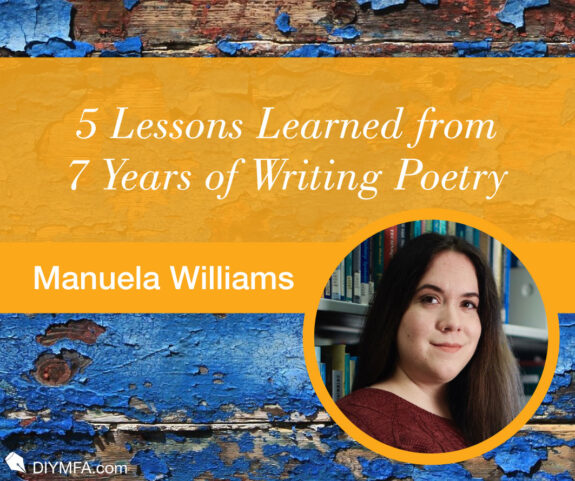Welcome back, poets!
This will be my final post as a columnist for DIY MFA. This is a bittersweet departure for me, but I’m excited to begin another chapter of my life! It’s truly been an honor writing for you all and I thought I’d leave you with some of the lessons I’ve learned from 7 years of writing poetry (I can’t believe it’s already been that long!).
My hope is that by sharing these lessons, I can inspire some of you to keep pushing forward with your own writing and maybe even pick up a pen and try your hand at poetry yourselves.
Without further ado, here are my top 5 lessons learned:
Lesson 1: Poetry Can Be About Taking Risks
Poetry can be risky business. Not in the sense of physical danger, but in the sense of vulnerability. When you write poetry, you’re often revealing your deepest emotions and thoughts. It’s an act of bravery to put those feelings out into the world.
However, taking risks doesn’t have to be about vulnerability or putting yourself out into the world in ways that you’re uncomfortable with. It can also be about pushing boundaries and challenging the reader (and yourself) to see things in a new light. It can be about experimenting with form and structure, playing with words and sounds, and digging deep into your own emotions and experiences to find meaning in the world around you.
The best poetry often comes from taking risks, from trying something new and daring to be unafraid to taking chances and experimenting with language and form.
So don’t be afraid to take risks with your writing—you never know what amazing things might come from it.
Lesson 2: Poetry Is About Finding Your Voice
When you’re first starting out as a poet, it can be easy to get caught up in the work of other writers. I find myself still doing this, too! You might find yourself trying to imitate the style of your favorite poets or their subject matter.
But the truth is, the best poetry comes from finding your own unique voice. Your voice is what sets you apart from other writers—it’s what makes your work stand out, so it’s important to take the time to explore yourself as a writer, experiment with different styles and subjects, and find what feels true to you.
Don’t worry about whether or not your work is “good” or “bad.” Just focus on finding your voice and expressing yourself honestly.
Lesson 3: Read Widely
Reading widely is an important part of any poet’s journey. It can provide inspiration, help you find your own unique writing style, and give you valuable insights into the various ways poetry can be used to express emotions and ideas.
Reading widely also helps you become more familiar with different poetic forms, styles, structures, and techniques.
Not only should you read a lot of poetry from different time periods, but I also recommend broadening your horizons by reading works from poets of different backgrounds. Diversity in literature is just as important as diversity in any other field.
Finally, remember to take the time to analyze each poem that you read. Think about what the poet was trying to convey through their words and why they chose particular language or a certain structure to do so. This kind of thoughtful analysis will help your writing become even stronger in the long run.
Lesson 4: Poetry Can Be Collaborative
Writing poetry doesn’t have to be a solitary activity. In fact, there is great power in collaborating with other writers, sharing ideas and inspiration to create something greater than the sum of its parts.
Collaborations can take many forms, from writing duos to group poetry sessions. They allow for diverse perspectives and experiences to come together in a single work, creating something that can be unique and powerful.
If you’re interested in collaborating with other writers, start by reaching out to fellow poets you admire or joining writing groups in your community. Experiment with different forms of collaboration and see what works best for you.
Lesson 5: Poetry Requires Patience
Writing poetry is not something that comes easily to most people. It takes time, effort, and patience. Sometimes you might find yourself struggling to come up with the right words or phrases, but that’s okay!
It’s important to respect the process of writing and take some time to explore and refine your ideas. Don’t get discouraged if things don’t come out as you expected. Instead, use it as an opportunity to learn more about yourself as a writer.
As with all good things in life, poetry is a skill that takes time to develop, so don’t be too hard on yourself when you’re just starting out.
My advice would be to practice regularly: set aside time each day or week to just sit down and write. Even if you don’t feel inspired, write something anyway. You never know what kind of magic might come from just putting words on paper.
And remember, patience also means giving yourself permission to revise and edit your work. Sometimes you’ll need to step away from a poem for a while and come back to it with fresh eyes. Don’t rush the process of perfecting your work—it takes time and effort to craft a truly great poem.
With that, I bid you farewell, poets! Keep writing, keep searching for your voice, and never stop taking risks with your words! I can’t wait to see what you come up with. 🙂

Manuela Williams is a Las Vegas-based writer and editor. She is the author of Ghost In Girl Costume, which won the 2017 Hard To Swallow Chapbook Contest. Her second poetry chapbook, Witch, is forthcoming from Dancing Girl Press. When she’s not writing, Manuela is busy drinking coffee and spending time with her blind Pomeranian, Redford.







